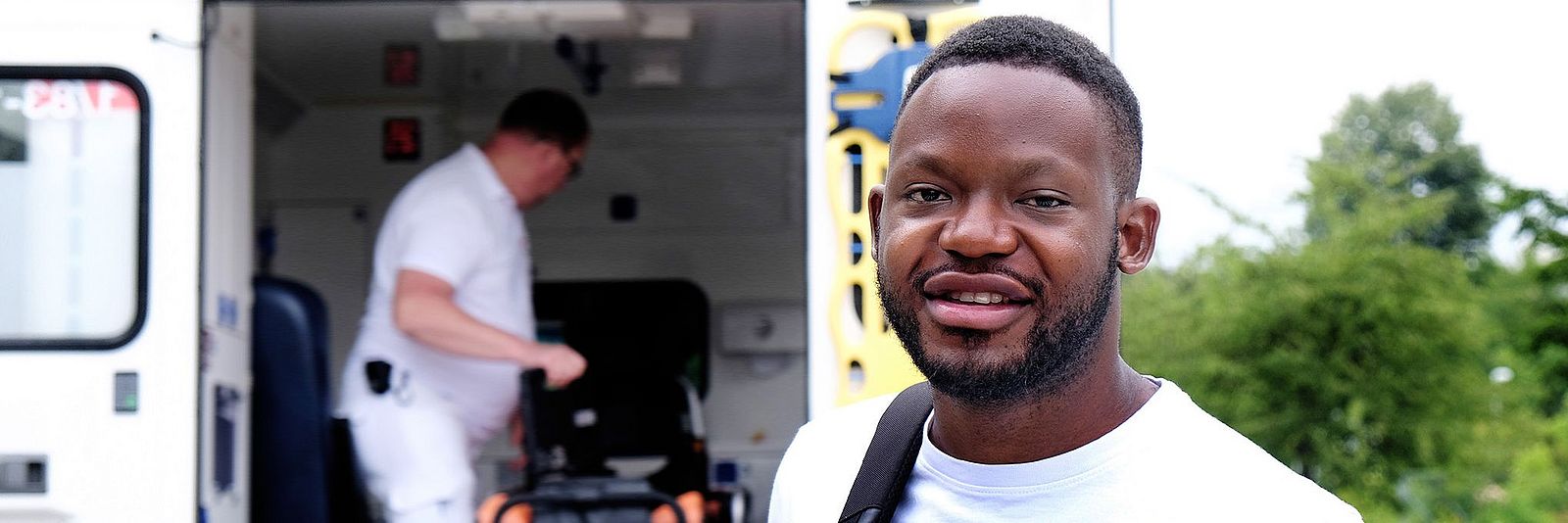The nursing profession is future-proof
Thanks to the excellent living conditions in Germany, a considerable proportion of the population enjoys good health well into old age. However, with increasing life expectancy and an aging society, combined with the decreasing number of young people beginning their professional career, the demand for professional nursing as well as basic medical care is rising. Germany does have a stable healthcare system; nevertheless, nursing professionals remain to be in high demand and their contribution is more important than ever. Hospitals, nursing homes and other care facilities are always on the lookout for nursing personnel with various levels of qualification in order to meet the increasing demand in the healthcare and nursing professions. This demand is predicted to increase in the following years. Would you like to become part of Germany’s healthcare system? Here you can find out how to start your future-proof career in the healthcare sector!

Tasks in the nursing field
As a nurse, you will take care of people and support them in every phase of their life, which includes the following areas of responsibility:
- Patient care
- Paediatric nursing (caring for children)
- Geriatric nursing (care of the elderly)
Your tasks in the nursing field will include independent observation, guidance, support and care of patients, both inpatient and outpatient treatment. Additionally, you may also document and evaluate nursing measures, as well as carry out medical instructions and assist with medical interventions. However, that will depend on your individual specialisation and qualification. While being a member of nursing staff, you are a competent contact person for members of the patient’s family.
Figures on nurses in Germany
1.7 million
people are employed in the nursing sector, geriatric nursing included.
Over 40,000
job positions in care facilities are vacant.
Entry requirements for international nursing professionals
Those wishing to work in the nursing profession in Germany on a long-term basis require official authorisation to practise their profession. As a rule, the following formal requirements must be met in order to be permitted to work in the nursing profession in Germany:
- Recognised qualification: The nursing qualification obtained in your country of origin must be recognised in Germany. The competent authority for your case will check whether your professional qualification is equivalent to German qualifications. If this is not the case, you could take an assessment test or go through an adaptation period to prove an equivalent level of knowledge. The application for professional recognition can be submitted to the competent authority in the state in which you intend to work in. The German professional recognition obtained is valid nationwide.
- Sufficient knowledge of the German language: Depending on the state, you will have to be competent on a level equivalent to the B2 or B1 levels of the Common European Framework of Reference for Languages (CEFR).
- Medical fitness: You must prove – through certification by a German doctor – that you are physically and mentally healthy and are therefore suitable for a job in the nursing profession.
- Personal suitability/Trustworthiness: In order to prove your trustworthiness, you will require proof that you do not have a criminal record. Depending on your situation, providing a certificate of good conduct from your country of origin or a German certificate of conduct (Führungszeugnis) is sufficient.
The decisive factor for the recognition of your qualification is not your nationality, but the place your qualification was obtained in. You can find more information on the topic of recognition, examinations, adaption periods and the competent German authorities responsible on the “Recognition in Germany” portal (available in multiple languages).
Do I need a visa?
As a citizen of the European Union, Liechtenstein, Iceland, Norway or Switzerland, you require neither a visa nor a residence permit to work in Germany. Citizens of other countries on the other hand require a residence permit. You can find out more about the work visa for qualified professionals in the “Visa” section.
Did you apply for recognition of your professional qualification and the certification authority in Germany has determined that you are missing certain qualifications to obtain full recognition? Then you can find out whether the visa for the recognition of foreign qualifications is an option for you.
Tip: Under certain conditions, you may also enter Germany for 6 months after completing your professional training to look for a job.
Next steps

✔ Your career prospects: With our Quick-Check, you can find out about the opportunities available to you for working and living in Germany.
✔ Start the recognition process: In our “Recognition” section, you can find more information on the recognition of foreign qualifications.
✔ Apply now: Find a suitable job position in our “Make it in Germany” job listings and use our tips for a successful job application in Germany.
✔ German language: Get useful tips on the best places and methods to learn German in the “Learning German” section!
Good to know:
There are several interesting projects offering special opportunities to work as a foreign nursing professional in Germany:
Triple Win Project
The Triple Win Project is implemented jointly by the Federal Employment Agency (BA) and the GIZ. The foundation of the project is formed by placement agreements between the BA and the partner countries’ employment authorities (Bosnia and Herzegovina, the Philippines and Tunisia).
The partner authority organises the application procedure locally and checks the incoming applications according to formal criteria. The BA assesses the applicants’ personal, professional and linguistic qualifications in individual selection interviews. A language test is part of the selection process: the GIZ offers language training for nursing professionals (level B1 of the Common European Reference Framework with technical terminology for nursing personnel), professional preparation for working in Germany as well as support in the integration and recognition process after arriving in Germany.
The new arrivals work as auxiliary nurses until their foreign qualification in the field of nursing and patient care has been recognised. This should take place within the first year of employment.
“Nursing in Germany” project: a programme of the Federal Employment Agency (BA) for nursing professionals from Mexico
The Federal Employment Agency (BA) – in partnership with the Mexican National Employment Office – is looking for qualified healthcare and nursing personnel from Mexico for Germany’s public health service. The “Nursing in Germany” project gives interested nursing professionals from Mexico new career prospects. German employers in the healthcare sector present their job opportunities at various locations and events in Mexico.
Those wishing to take part in the project should be willing to relocate, show interest in working abroad and be prepared to obtain the necessary skills in the German language within 12 months. An academic qualification from a Mexican university is also required. The nurses receive several forms of support on their way to Germany: for example, financing of language courses in Mexico and Germany, funded guidance when applying for a visa and support for the recognition of professional qualifications.
How can I take part in the project? What does the project offer in particular? Who can I reach out to if I have any questions? Find more information on the BA and the Mexican Employment Authority’s project on the “Nursing in Germany” website.
The path to employment in Germany does not necessarily have to include a recruitment program: The Customer Center of the Federal Employment Agency advises, places and supports prospective immigrants on an individual basis.


